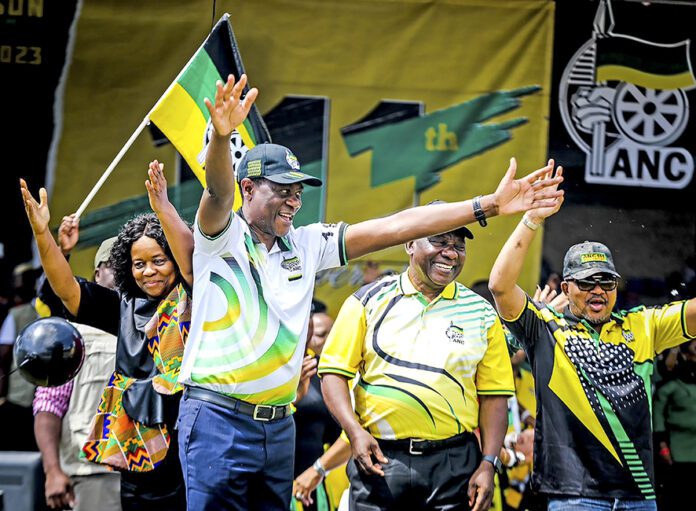The ANC celebrated 111 years of existence in Mangaung, Free State, and the president of the party, Cyril Ramaphosa, delivered the January 8 statement, which traditionally is a way for the ANC to pave the way for the new political year ahead.
The president listed the party’s priorities for 2023, which include resolving the energy crisis and tackling loadshedding, job creation, improving the delivery of basic services, combating crime and corruption in South Africa.
Despite the listed priorities, South Africa grapples with pressing challenges that have been ongoing for over a decade now. The country is experiencing crippling power outages, with Eskom, showing no signs of being able and capable of fixing the power supply.
We are facing one of the highest unemployment rates at 43,1% in Q3 of 2022. It is without a doubt clear that the youth in South Africa continue to be disadvantaged in the labour market with an unemployment rate higher than the national average, with 42,1% in the first quarter of 2022 for those aged 25–34 years (Statistics South Africa, 2022).
The continuous poor access to healthcare, basic services, poor implementation of governance and accountability mechanisms and increasing national debt are some pressing issues we are facing as a country. Most importantly, the country has also been experiencing low economic growth over the years despite a surprising gross domestic product growth of 1,6% in the third quarter of 2022. Low economic growth has major implications on job creation, and the following factors may have contributed to this:
Weak education system
A survey was completed in 2020 to benchmark the quality of education by country at a global level. South Africa was ranked second last in the world. We were ranked 75 out of a total of 76 countries. While in another World Economic Forum (WEF) 2017/ 18 Global Competitiveness Report South Africa was rated 114th out of 137.
Constraints on small and medium-sized enterprises
Small and medium enterprises are well known to be vital contributors to reducing unemployment and creating economic participation. A report by the International Finance Corporation estimated SMEs constituted over 90% of all formal business and contributed 34% of GDP. Several factors, which include high levels of government bureaucracy, significant tax burdens and labour regulations that are restricting, prevent SMEs from being bigger job creators.
Poorly managed state- owned enterprises
For more than 10 years, we have seen South Africa’s state-owned enterprises decline significantly. These SOEs have fallen victim to operational inefficiencies, financial mismanagement, poor governance and lack of integrity by its leaders. This includes Eskom, Prasa, Sanral, Transnet and SAA.
Tender rigging, delayed projects, inefficient boards, and state capture have unfortunately resulted in inadequate service delivery and has seen the country being robbed of billions of rand. The potential to develop our country has diminished as resources have now been shifted away from creating value for the South Africans to enhancing a few people’s needs.
The World Economic Forum flagged the prolonged economic stagnation in South Africa as the most serious risk to the country’s recovery over the next two years.
The pace of economic growth has been moderate
South Africa’s political and economic outlook is gloomy. The future of the country looks grim and South Africa is a broken state. One of the ANC’s priorities for 2023 is “boldly mobilising social partners around economic reconstruction and recovery in order to increase job creation, investment and empowerment and action to build a better Africa and the world”.
Over the years we have seen the ANC develop policies but later fail to adequately implement, recycle party members into cabinet, become more corrupt, care more about their interests than of South Africans, cadre deployment, mismanagement of funds and collapse SOEs which impedes development and job creation.
The real question remains: how will the governing party plan to have systems in place to achieve the resolutions they have adopted? South Africans have reached their limit of anger and tiredness, and seek change with new ideas, strategies, bold and realistic ideas, and policies that will resonate with the people of South Africa, both in rural and urban areas, better leadership with high integrity to further develop the country and better prospects of growing the economy for a better outcome for South Africans.
Our leaders need to come together and adopt a coordinated approach to tackling unrelenting challenges of this country and ensure to build resilience and strong coordination ahead of any crisis we may face.
Combating corruption is one of ANC’s top priorities for the year and for many years the ruling party has failed to deal with this. However, will 2023 be any different? South Africans now need to start seeing prosecutions instead of arrests and case postponements only.
The time for campaigns and fancy catchy phrases should be over. The time for the ANC to act and stay true to its word is now more than ever.
- Ngqambela is a researcher at Rivonia Circle with interest in socio-economic research, policy and politics.
Follow @SundayWorldZA on Twitter and @sundayworldza on Instagram, or like our Facebook Page, Sunday World, by clicking here for the latest breaking news in South Africa. To Subscribe to Sunday World, click here.




